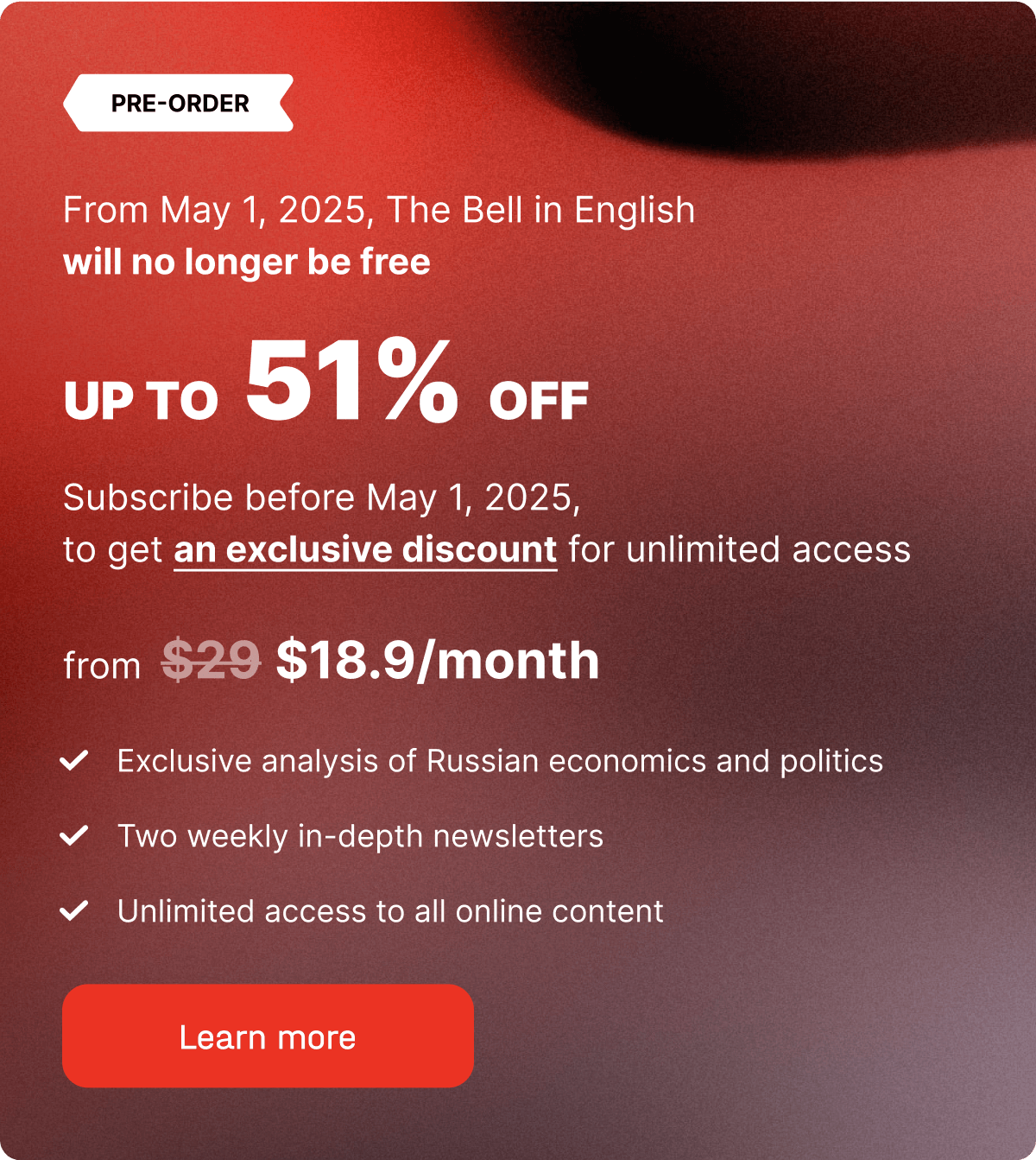
What a Trump presidency means for the Russian economy
Hello! Welcome to your weekly guide to the Russian economy—written by Alexandra Prokopenko and Alexander Kolyandr and brought to you by The Bell. Our top story this week is a look at how Russia reacted to the election of Donald Trump as U.S. president and what it might mean for the Russian economy in the coming years.
Cautious optimism as Russia reacts to Trump victory
Russian President Vladimir Putin on Thursday publicly congratulated Donald Trump on his election win and called him “courageous.” Both leaders have said they are ready to talk to one another, and it seems now to be just a matter of time before such a conversation actually takes place. However, in private, Russian officials are not optimistic much will be achieved. Either way, Trump’s presidency won’t have much economic impact on Russia unless peace is achieved in Ukraine and Russia’s global isolation comes to an end.
How Russian officials and business people reacted to Trump’s win
Despite initial restraint (“We won’t congratulate Trump, this is an election in an unfriendly country,” Putin’s spokesman Dmitry Peskov said Wednesday), the Kremlin has not tried very hard to hide its satisfaction at Trump’s win. By the end of the week, there was open rejoicing. In his annual address to foreign experts at the annual meeting of the Valdai Club, Putin congratulated Trump, paying him several compliments and confirming he was ready to “renew contacts” and “hold discussions.” Trump was similarly bullish on Thursday about the prospect of contact with Putin, telling NBC: “I think we’ll speak.”
However, in off-the-record conversations with The Bell, Russian officials and executives were less optimistic. Russia’s international isolation has left the country’s elite largely indifferent toward the vicissitudes of U.S. politics. “Ideologically, Trump is probably closer to us but in practice it makes no difference,” said one official. The U.S. elections are a matter for the Kremlin and the secret services, said another official, adding that the Russian economy is under pressure from sanctions that “in any event will remain in force.”
“In the Kremlin, of course, they wanted Trump,” said an ex-official. “He’s free of all these prejudices about democracy, so if there is something to negotiate it will be easier with him.”
The reaction was noticeably more muted than in 2016 when Russian officials and propagandists were openly joyful about Trump’s election victory. “I want to drive around Moscow with an American flag,” the head of Russia Today, Margarita Simonyan, tweeted back then. Ultimately, however, Trump’s first term did not result in any easing of sanctions, nor in any significant improvement in U.S.-Russia relations.
Of course, much depends on Putin, whose position vis a vis the West seems to have hardened since 2016. “There is only one captain of our boat [Putin] and everything depends on his wishes, behavior and condition,” the ex-official said.
Some believe Trump’s election will mean domestic turmoil in the U.S., divisions in the Western military alliance NATO, and a split between Washington and European capitals. The former official said that, for Putin, the more chaos wrought by the U.S. elections, the better. “It distracts the west’s attention from Russia: the U.S. has a huge backlog of internal problems that need to be fixed. Europe is expecting a cooling of relations and will focus on their own issues. Therefore, Putin will be left to his own devices,” he said.
Representatives of the Russian business community were generally cautious in their assessment of a Trump presidency. “If Trump forces Nabiullina to reduce interest rates, that would be a win,” quipped the deputy head of a large manufacturing company. Indeed, Russian businesses are far more focused on immediate problems. Aside from Western sanctions, there is a major labor shortage and the costs of capital are rising rapidly due to high interest rates (which reached 21% earlier this month). “Thinking about long-term plans mainly leads to depression,” executive Dmitry Alexeyev said last month.
How a Trump presidency might hit Russia’s economy
There will be no immediate impact on the Russian economy from Trump’s election. To a large extent, Russian markets are shielded from international turbulence by Western sanctions, and minimal economic ties. However, Trump may have an indirect effect on Russia’s economy simply because of the huge rule the U.S. plays in the world.
Above all, Trump’s victory likely means a strong U.S. dollar. This is a consequence of higher interest rates in the U.S., and the risk of trade wars limiting growth in developing economies. Bloomberg economists calculated that, if Trump imposes a 60% tariff on goods from China, and a 20% tariff on other countries, then the U.S. dollar might strengthen 10%.
If U.S. import tariffs are increased, then this will accelerate global fragmentation and likely see other countries coalescing into trading blocs. It will mean a further deterioration of U.S. relations with China, and maybe even several rounds of tariff wars.
For Russia, this would mean slower economic growth. If all U.S. trading partners respond in kind to U.S. tariffs, by 2028 the overall damage to global GDP will be 0.5%, Bloomberg reported. If trading partners do not respond, the global economy will suffer less (but Chinese GDP growth would still be about 0.4% less). This all translates into lower demand for Russian exports, particularly crude oil, oil products and metals.
Trump’s policies might also hit Russian oil producers from another direction. Throughout his campaign Trump has called on producers to drill as much oil as possible – an approach that could end up increasing global supply, and depressing prices.
In addition, if we do see tariff wars, it will lead to a temporary spike in container shipping prices (as producers rush to move goods before the measures come into force). For Russia, this could mean an increase in import costs (on top of the effects of a stronger U.S. dollar).
Bottom line
Lower oil prices, a stronger U.S. dollar and more expensive imports are all bad news for the Russian economy. But Trump’s election also opens up the prospect of Putin cutting a deal with Trump to end the war in Ukraine, and potentially easing sanctions. The Moscow Exchange index rose briefly on Wednesday, lifted by hopes of a ceasefire. The Russian ruble also strengthened.
While nobody expects the war to end overnight, there is now a route to some form of conclusion – however unfavorable to Ukraine. “Let’s see what a deal might look like, and whether it will be concluded at all,” said Russia expert Alexander Gabuev.
Why the world should care
Trump’s main quality is his unpredictability, and nobody can say with any certainty what his election will mean for U.S. foreign policy. The economic policies he promised during the campaign could further fragment world trade, reduce oil prices and strengthen the U.S. dollar. That’s bad news for the Kremlin, since it would slow the Russian economy and accelerate inflation. However, this is balanced by hopes that Trump could achieve a settlement to the Ukraine war, and lift some sanctions. These hopes are unlikely to be completely met, but just their existence is a boost to Russia’s economy.
Figures of the week
The U.S. and the United Kingdom both cut interest rates 0.25 percentage points Thursday. The Federal Reserve unanimously voted to reduce interest rates from 4.75% to 4.5%, saying it has “made progress” toward its 2% inflation target (despite a rise at the start of this year, unemployment remains low). On the same day, the Bank of England reduced its rate to 4.75%. In normal times, rate cuts for major reserve currencies would lead to an increase in the inflow of carry trades on the Russian market, boosting both the ruble and the stock market. However, the effects are limited this time because of Russia’s isolation.
Bosphorus Gaz, Turkey’s second biggest private importer of Russian natural gas, is launching a ruble currency swap to simplify cross-border settlements. To pay for goods, Russian companies will now be able to transfer rubles to Bosphorus Gaz, which will then pay the equivalent sum in euros to the Turkish exporter. These euros are easier than rubles to use in Turkey, making life easier for the Turkish companies. This is yet another example of how Russian trade is finding ways to get around Western sanctions.
The high interest rates being offered on deposits in Russia have led to record increases in savings. According to state-owned bank VTB, over the past nine months the total market volume of retail liabilities in rubles is up at least 19% to over 49 trillion rubles ($0.5 trillion). By the end of the year, the increase could be as much as 29%.
Between Oct. 29 and Nov. 5, weekly inflation in Russia slowed from 0.27% to 0.19%, according to the Economic Development Ministry. Annual inflation fell from 8.57% to 8.53%. However, food prices continue to rise — they were up 0.61% last week.
Further reading
Trump and the Future of American Power



PAID SUBSCRIPTION LAUNCH
From May 1, 2025, The Bell in English will no longer be free
From May 1, 2025, all The Bell’s newsletters and online content will be behind a paywall. We have taken this decision so that The Bell can remain financially independent, and maintain our high standards of journalism and economic expertise






